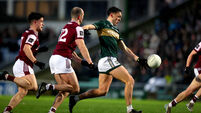Keher lays his cards on the table

What Eddie Keher wants to make clear is his document isn’t a Kilkenny one. He wouldn’t have put fingertip to keyboard were it not for first canvassing opinions of hurling people from other counties.
As most things do, it started with a conversation. Then another followed by another before someone convinced him that his views represented many within the game and he should do something about it. Keher is a long-time critic of how hurling is officiated, but the border-line sendings off of Henry Shefflin, Pa Horgan and Ryan O’Dwyer last year agitated him greatly.
Even if Kilkenny’s three-in-a-row attempt stalled before the All-Ireland quarter-finals, he was absorbed by a thrilling Championship.
But the six-time All-Ireland winner couldn’t help thinking the high entertainment value of the competition was provided in spite of a flawed disciplinary system.
“I should mention that I was never in favour of cards in the first place,” he writes in the document, “and I contend that the 2013 season in particular has confirmed that they are not compatible with Gaelic games.
“This has been confirmed at top level by virtue of the fact that many of the ‘sendings off’ from yellow/red cards were later rescinded by the committee in charge.
“Unfortunately, the teams suffering from those injustices have been wrongly penalised, in that the result of the games cannot be reversed, or a replay called for. This was, of course, fully accepted by the teams involved in true sporting fashion.”
Keher makes the point yellow and red cards were replicated from soccer, introduced to that sport for the 1970 World Cup to address the language barrier. “Totally at variance with the ethos, physicality and manliness of the game of hurling,” he writes.
It is because of the cards, first introduced to the GAA in 1999, that he feels cynicism has crept into hurling.
“Players are now encouraged to feign injury, or duck in under the opposing player’s hurley in order to have him issued with a card. This is a most unwelcome trend in our traditional and otherwise sporting games.
“Hurling was never a cynical game, but it is now starting to become one due to the unjust penalties imposed for fouls by players full of honest endeavour. With the introduction of all these restrictions and penalties, and now the proposed introduction of ‘black cards’ for hurlers, the players are appearing to be treated and regarded as the ‘bad guys’ of our games.”
It’s Keher’s assessment players, or defenders, are confused about how to tackle without committing a foul and incurring a yellow card.
“What should a defender do when a forward is charging towards the goal with the ball? There have been several instances where the defender stood in front of him with his arms outstretched to be penalised when the forward ran into him and fell? Fair, manly tackles should always remain part of our game.”
Keher’s method of replacing the yellow and red card is a return to the system that existed before 1999.
A technical foul is penalised by the awarding of a free only. “99% of frees taken in hurling up to almost 100 yards (120 yards in the case of Anthony Nash!) are converted by scoring a point,” he states. A player found to have committed an act of dangerous play, resulting in minor injury, would be warned, have his name taken as well as a free being called against him. A repeat offence and he would be sent off. A player who deliberately strikes an opponent with the intent to injure would be dismissed.
According to Keher, the withdrawal of cards would also reduce the role of referees to “facilitators” of matches and the potential for them to be involved in controversies.
Last month, he was at Kilkenny’s challenge game against Wexford in aid of Tomás Waters. The game wasn’t overly intense, but he was struck by how well former inter-county referee Dickie Murphy handled it.
“There was only one dangerous tackle from which a yellow card was shown. The card was shown quickly and just to the player involved, and not triumphantly for all the world to see, as we are now witnessing from referees. Dickie’s performance was a breath of fresh air.”
As an addendum, Keher supports the motion of 20-metre frees and penalties being struck on or before the 20m line. An expert free-taker himself, his reasoning is down to safety concerns. “With the present composition of the ball and the use of synthetic hurleys, a serious injury will result soon from a defender being struck with the ball from 13 to 15m.”
He also believes the use of substitutes is abused. “I recommend no subs be allowed within 10 minutes of the end of a game. In the case of serious injury during that period, a sub could be allowed at the discretion of the referee.”
Before Christmas, Keher delivered his document to GAA president Liam O’Neill who has asked him to speak to a couple of committees.
A move away from cards, he knows, would cut ties with football, already on another plateau with black cards. But few know better than him how unique hurling is. He just wants it treated as such.











